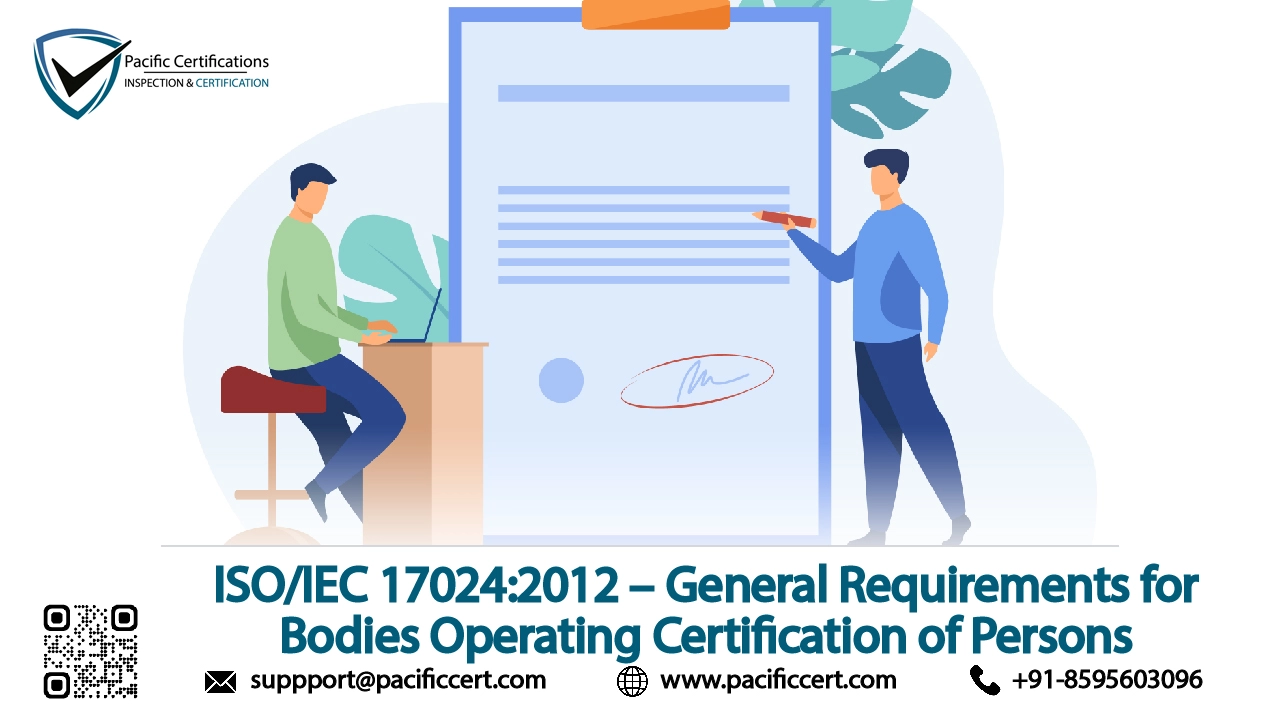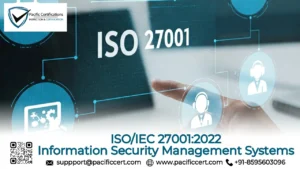What is ISO 17024:2012?

ISO/IEC 17024:2012 is an internationally recognized standard that outlines the requirements for organizations responsible for certifying individuals across professions. It establishes a structured framework to assess the competence of individuals, ensuring that certifications are impartial, valid and accepted globally. This standard ensures that personnel certification processes are transparent and reliable, enabling industries to depend on certified individuals in roles that require specific expertise.
ISO/IEC 17024 supports industries in managing risks related to unqualified professionals and improves public confidence in certifications issued by accredited bodies. It is widely adopted in sectors such as cybersecurity, quality auditing, engineering, healthcare, environmental management, aviation and financial services.

To begin your ISO/IEC 17024 certification audit or align your personnel certification program with international standards, contact us at support@pacificcert.com
Purpose
The purpose of ISO/IEC 17024:2012 is to build consistency and trust in the way professionals are evaluated and certified across different regions and sectors. In today’s workforce, professional qualifications must be reliable, comparable, and objective, especially in roles that involve safety, compliance or technical decision-making. This standard ensures that certification bodies apply uniform competence criteria, develop schemes rooted in job-specific requirements and conduct evaluations using qualified personnel.
It also seeks to reduce inconsistencies in certification practices by eliminating conflicts of interest and enforcing strict operational controls. Whether for technical experts or management professionals, ISO/IEC 17024 strengthens the credibility of certificates and provides employers and regulators with greater assurance when hiring or approving certified personnel.
Scope and Applicability
ISO/IEC 17024 is applicable to all organizations that certify individuals, regardless of size, industry or jurisdiction. It is designed for personnel certification bodies involved in assessing competence in a range of disciplines, from occupational health and safety to IT governance, project management and renewable energy systems.
The standard applies to certification schemes that cover knowledge, skills and personal attributes. These may include written exams, practical demonstrations, interviews or continuous assessment. ISO/IEC 17024:2012 supports private entities, governmental institutions and international associations aiming to create recognized certification frameworks.
It is particularly relevant in fields where regulatory bodies, employers or public institutions require proof of competence to safeguard public interest, ensure technical consistency or meet contractual conditions. The standard enables global recognition of certified individuals, especially in cross-border service environments.
Key Definitions
- Certification Body: An organization that assesses and certifies individuals for professional competence.
- Certification Scheme: A documented framework that includes evaluation methods, competence criteria, and recertification rules.
- Impartiality: The absence of bias in assessment and decision-making.
- Surveillance: Ongoing monitoring to verify that certified individuals remain competent over time.
- Validity Period: The duration for which a certificate remains in force before recertification is required.
Clause-wise structure of ISO 17024
Clause | Title | Description |
1 | Scope | Details applicability to any body certifying individuals in any sector. |
2 | Normative References | Lists supporting documents and related ISO standards. |
3 | Terms and Definitions | Provides official terminology used in the standard. |
4 | General Requirements | Focuses on legal status, liability, impartiality and financing. |
5 | Structural Requirements | Outlines governance, management responsibility, and organizational structure. |
6 | Resource Requirements | Specifies competence requirements for assessors and decision-makers. |
7 | Records and Information Requirements | Addresses documentation, data security, and public access. |
8 | Certification Scheme | Describes design and maintenance of valid, reliable certification schemes. |
9 | Process Requirements | Covers the entire lifecycle, application, evaluation, decision, surveillance. |
10 | Management System Requirements | Requires internal audits, reviews, and corrective actions to maintain quality. |
What are the requirements of ISO 17024:2012?
Organizations aiming to implement ISO/IEC 17024 must address structural, operational, and procedural elements to ensure conformity with the standard. The process is not limited to issuing certificates but includes mechanisms for ensuring ongoing competence, integrity in decision-making and scheme development that reflects actual job roles. Below are some of the key requirements:

- The certification body must operate independently from training entities or other groups with commercial interests to maintain impartiality.
- Assessment methods must be valid, reliable, and periodically reviewed to reflect changes in the profession or industry.
- All decisions related to certification must be based solely on the candidate’s competence, documented through objective evidence.
- Certification schemes should include clear criteria for eligibility, assessment methodology, re-assessment, and revocation.
- Surveillance must be implemented when the profession demands continuous proof of competence over time.
- Complaints and appeals procedures must be accessible, fair, and handled without bias.
- Internal audits and periodic management reviews must be carried out to sustain system performance and correct identified issues.
To initiate your ISO/IEC 17024 certification journey, reach out to us at support@pacificcert.com
What are the benefits of ISO 17024:2012 Certification?
Certifying individuals under ISO/IEC 17024 provides measurable advantages to certification bodies, industries, employers and professionals. These benefits are both operational and reputational:

- Stronger international recognition for certified professionals, improving cross-border employment and credibility
- Fair and impartial evaluation systems that build trust among stakeholders, clients, and regulators
- Consistent certification outcomes through structured assessment schemes tailored to job-specific competencies
- Lower risk of unqualified personnel in safety-critical or technically demanding roles
- Improved governance and accountability within certification bodies through structured decision-making and audits
- Better integration with national or international accreditation frameworks for mutual recognition
- Improved workforce quality across industries that rely on certified individuals for performance and reliability
Market Trends
In the recent years, ISO/IEC 17024 is seeing widespread global use as industries prioritize reliable certification mechanisms. There has been a notable increase in demand for ISO/IEC 17024-conforming certifications in emerging economies, especially in sectors like renewable energy, infrastructure, digital skills and healthcare.
A trend toward integrated systems, combining ISO/IEC 17024 with ISO/IEC 17065 or ISO 9001 is also emerging, allowing organizations to manage product, system and personnel certifications under one framework. This alignment is helping both regulatory bodies and private sector entities reduce audit overlaps and improve efficiency.
ISO/IEC 17024 Certification Audit Checklist
An internal audit checklist helps identify readiness before undergoing third-party evaluation. Common elements include:
- Is there an impartial certification committee or review board?
- Are assessment methods documented, reviewed, and validated regularly?
- Is there a complaint and appeal procedure accessible to applicants?
- Are personnel qualified and periodically assessed for competence?
- Are confidentiality and data protection policies implemented for applicant data?
- Does your management system support documentation, audits, and corrective actions?
- Are certification schemes updated to reflect changes in legal, technological, or industry requirements?
ISO 17024 Certification Process and Procedure
The path to ISO/IEC 17024 certification typically includes these stages:
- Gap Assessment
Initial analysis of current systems and practices to compare against ISO/IEC 17024 requirements. - Implementation and Documentation
Design and formalize certification schemes, assessment processes, decision-making policies, and management oversight. - Internal Audit and Review
Conduct internal evaluations to confirm system effectiveness, identify gaps, and apply corrective actions. - Third-party Certification Audit
Undergo external audit by an accredited body, including document review, interviews, and on-site evaluations. - Surveillance and Reassessment
Maintain certification with regular surveillance audits and periodic scheme reviews.
Certification Timeline for ISO/IEC 17024
The implementation timeline varies depending on how developed your current processes are. For certification bodies starting from scratch, the process can take between 6 to 9 months. If your organization already uses other ISO management systems like ISO 9001 or ISO/IEC 17065, timelines may shorten to 4–6 months. Key timeline stages include scheme development, internal audit preparation, third-party audit and surveillance.
Certification Cost for ISO/IEC 17024:2012
The cost of ISO/IEC 17024 certification depends on the complexity and volume of your certification schemes, the number of candidates processed annually, and the level of support needed. Costs involve auditor time, documentation reviews and surveillance fees. Internal resource allocation for scheme development, competence evaluation and complaint handling can also contribute to costs. Budgeting should also consider future recertification and audit cycles.
How Pacific Certifications Can Help?
Pacific Certifications offers accredited audits and certification services for ISO/IEC 17024. We specialize in assessing personnel certification bodies across sectors such as engineering, environmental health, IT, and safety. Our focus is on evaluating your actual system performance, not just documentation.
We assist with:
- Conducting readiness assessments before third-party certification
- Performing Stage 1 and Stage 2 certification audits
- Supporting scheme evaluation and operational reviews
- Providing training and awareness programs tailored to certification bodies
To initiate your ISO/IEC 17024 certification journey, reach out to us at support@pacificcert.com
ISO/IEC 17024 Training and Courses
Pacific Certifications offers ISO/IEC 17024-specific training programs designed to prepare teams for both implementation and audits:
- Lead Auditor Training – Equips professionals to conduct external third-party audits.
- Lead Implementer Training – For those responsible for planning and executing ISO/IEC 17024 implementation.
- Internal Auditor Training – Preparing internal auditors for certification audits
If your organization is planning to adopt ISO/IEC 17024, we can support your training needs. Contact us at support@pacificcert.com
Frequently Asked Questions (FAQs)
Is ISO/IEC 17024:2012 mandatory for all certification bodies?
No, but it is internationally recognized and often required by regulators and accreditation bodies.
Can training organizations also be certification bodies?
Only if clear separation of roles and impartiality are ensured. Otherwise, conflict of interest may occur.
What types of assessments are allowed under ISO/IEC 17024?
Written tests, interviews, practical evaluations, and continuous assessments are all valid if documented.
How long does ISO/IEC 17024:2012 certification last?
Typically, certification is valid for three years, with surveillance audits in between.
Does ISO/IEC 17024 apply to product certification?
No, it specifically applies to the certification of individuals, not products or systems.
Ready to get ISO 17024:2012 certified?
Contact Pacific Certifications to begin your certification journey today!
Suggested Certifications –
Read more: Pacific Blogs






